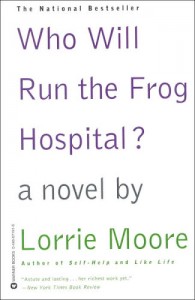Review by Chelsea Archer

Lorrie Moore
Who Will Run the Frog Hospital?
1994
Vintage
978-1-4000-3382-9
“In Paris we eat brains every night. My husband likes the vaporous, fishy mousse of them. They are a kind of seafood he thinks, locked tightly in the skull, like shelled creatures in the dark caves of the ocean, sprung suddenly free and killed by the light; they’ve grown clammy with shelter, fortressed vulnerability, dreamy nights. Me, I’m eating for a flashback.”
The first paragraph of Laurie Moore’s Who Will Run the Frog Hospital opens a novel telling of wild youth, unseized potential, and adult disappointment. Known for her short story collections, Moore’s second full length novel brings together elements of short fiction as the narrative tracks protagonist, Berie, through recollections of her childhood in upstate New York and recognizes the unfulfilled status of her marriage and adult life.
The story begins in first person present where it introduces Berie and her husband Daniel in Paris. We are given an immediate impression of discontent before being whooshed back to her childhood. The story subsequently pops back and forth between the past and present for the remainder of the novel. In these spaces between time we gain insight into who Berie truly is and who she once was.
In a present conversation with her husband, Berie lies about her past, a lie that brings us, the reader, into her confidence. “‘You’re no hoodlum.’ ‘That’s true,’ I say sighing. And in this lie I feel close to him, so grateful to him, so full of pity. It goes like that. Our talk goes something like that” (48). While the majority of the novel takes place in Berie’s past, it acts like a framing point, a way for us to understand who this woman is and how she became this way. Without these flashbacks the shadow of a woman that Berie has become would hold no emotion or interest due to lack of context.
As we bounce back and follow Berie around a small town called Horsehearts, we witness life in the 1970’s. Here, teenagers smoked weed, listened to records, and drank booze–the horror of Vietnam far from their minds. Berie and her best friend Sils (the beautiful one) sneak out at night, use fake ID’s, and allow strange men to drive them home, yet their reputations remain intact, the mask of sensible girls pulled firmly into place.
Now, it can happen that flashbacks can become tiresome, can begin to feel unimportant, but Moore does a smart thing–for every 20 or 30 pages of flashback, she inserts a short burst of flash forward. “When, three years later, LaRoue hung herself in the county hospital psychiatric ward, the nurses arriving too late to cut her down, I would remember this exuberance, the hollow nervousness and yet the genuine sororal note, rattling around there, trying to get out” (140). These moments serve to make the past feel more immediate, to give it a solid footing in the present moment. We now understand the stakes in that the moment that the protagonist doesn’t.
It’s these elements that make Who Will Run the Frog Hospital such a poignant and entertaining novel. At the close of the story we realize what the narrative tells us–the past makes us who we are in the present and forces us to remember the ideals that were once of such import. Simply because time has passed and things have changed does not mean that the same things we cherished as children no longer touch our hearts.
